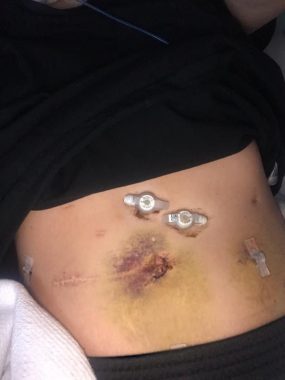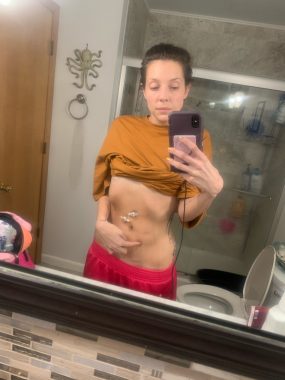What’s a Gastric Pacemaker, and Why Do I Have One?
Written by |
I want to introduce you to my gastric pacemaker.
I’m not sure how many people know about her or what she does, and how she may have saved my life on more than one occasion. She wasn’t a fast fix. The girl is a slow worker. But over time, she’s done a lot.
When I first got my “G-maker,” I was hoping for any and all improvement. My stomach motility had declined to the point where my G-tube, which goes into my stomach, was rarely useful, and a J-tube to my intestines was being considered. If I had to explain it scientifically, I would say that a gastric pacemaker is a lot like an ordinary pacemaker, but it’s “near your gastrics.”
The one in my chest is a pacer and a defibrillator (overachiever), and though he has paced many an episode over the years (I’ve gendered them with little methodology), my solid heart medication regimen has thankfully prevented defibs to date. My Young-Easy-G-Peezy, however, is meant to shock my stomach until the muscle contracts and food moves through it, like that episode of “The Magic School Bus” where the whole class was swallowed and rode that righteous reflux wave home.
My pacemaker worked, even if my various nicknames for it don’t. I gained weight. I stopped using Zofran (ondansetron) all day, every day. (Now it’s a once-a-day-ish practice, with some frisky flirts toward CBD and promethazine on the side.) And although I definitely feel the machine thrust within my short torso when dancing and lifting my leg, it’s a sacrifice I’m willing to make.
Then, the last few months happened. Although my gastric pacemaker has little to do with it, I wish she could somehow save me.
First, I want to throw a hefty trigger warning at those reading who can’t handle discussions of weight, because I’m about to candidly mention it. If you’re not from the CF community, you might think weight discussions are weird, tacky, or rude, but in our world, they happen all the time. There are no trigger warnings in our clinics. There are no questions of whether it’s OK or right by us. It’s the Hot Dish of the day, every day, and that’s just how it goes.

One week after gastric pacemaker surgery in 2017. (Photo by Bailey Anne Vincent)
For context (in case you don’t have your PhD in CF or CF-related diabetes), doctors prefer our body mass index (BMI) to be a little “too high” for our bodies whenever possible, because the more weight we’re carrying, the less dangerous an infection, surgical recovery, or unintended loss may be. The more we weigh, the more we can fight, basically.
So, within the CF community, gaining weight and having a little “extra” is aspirational, unlike the dance world, which often leans toward the “leaner” side of the linguistic lexicon. And that’s a problem, at least for me. Because the warring sides of the weight debate hold more weight than I’d like.
“You’ve lost 13 pounds since you were last here,” my gastric pacemaker practitioner said during our last telehealth appointment. I felt like someone had slapped me across the face. Even though I know my digestive limitations have been busting my BMI lately (which I believe is an archaic, bogus form of measurement), I had no idea it was that bad, nor did I want to face the future possibility of an ostomy being my best solution.
“Any time anyone is trying to decide what to do,” a fitness advocate friend of mine said, after turning her life around with less intestine, “I say, take the bag.”
The problem is, I’m not ready for another thing (but dang, if those numbers didn’t push me in that direction). My pacemaker has helped with a lot, but sadly, she can’t help with this.

Pointing to the vague blob that is the pacemaker in 2021. (Photo by Bailey Anne Vincent)
So, what do I do? I can’t blame the device that’s done its best. I can’t blame the pancreatitis rounds and rectal relapse that led us here this year. I can’t blame myself — but I do.
I’m not ready for action. Not mid-dance season. Not on the heels of so many recent surgeries. Not with so much on my plate, and yet, so little. (That’s called a play on words.) Not with the worry that worrying about this openly in a column without ample warning to weight-sensitive friends will lead to hurt on another end. We are all weight-sensitive friends, because society has made us that way. Hurt us that way.
Weight is never easy to talk about, to say the least. But sometimes we need to hear what we need to fix in order to face it.
***
Note: Cystic Fibrosis News Today is strictly a news and information website about the disease. It does not provide medical advice, diagnosis, or treatment. This content is not intended to be a substitute for professional medical advice, diagnosis, or treatment. Always seek the advice of your physician or other qualified health provider with any questions you may have regarding a medical condition. Never disregard professional medical advice or delay in seeking it because of something you have read on this website. The opinions expressed in this column are not those of Cystic Fibrosis News Today, or its parent company, Bionews, and are intended to spark discussion about issues pertaining to cystic fibrosis.








Leave a comment
Fill in the required fields to post. Your email address will not be published.